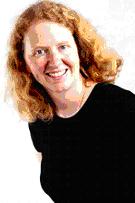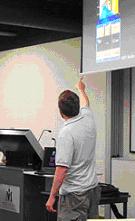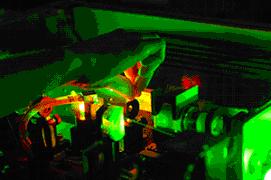|
Laser
Cooling?
Judith
Dawes
Associate Professor, Physics
Macquarie University
The
high point of my day was a seminar that I organised for a
visiting scientist, Dr David Kielpinski, of Griffith University
in Bribane. He has an exciting research program combining
two very interesting areas of physics today, namely quantum
computing and laser - cooling.
Using lasers that are tuned just off the correct wavelength,
he can "cool" ions or atoms to fractions
of a kelvin in temperature! He hopes to then "address"
these atoms and ions using other lasers, and to store information
and process this information as different energy states of
the ions. By doing this with individual ions at particular
locations (and even moving them around), he hopes to develop
a quantum computer!
My job is as a scientist and educator.
I need to keep learning in order to teach
my students up to date information about physics, and I need
to keep learning as a scientist, so that I can understand
where my field is going and keep up with others' discoveries.
Attending seminars and conferences and reading articles written
by other scientists are the main ways that I can keep up with
developments in my research area so that I can plan new
experiments. In this case, I heard David give a seminar
elsewhere and invited him to come to Macquarie University
so that others in my department could hear about his work
also. David came to Sydney to meet with other scientists at
the National Measurement Laboratory; so we combined his visit
to Macquarie with that. Just before his seminar, he had a
tour of our laboratories, and we described our research.
In high school, I was interested in
lots of things.
I enjoyed learning various subjects, including Maths, History,
English, Music and Chemistry! I wanted to study science at
university as I believed that it was a more concrete grounding
for a career. (I also come from a family
that is interested in science!)
I initially aimed to be a mathematician,
but I discovered that I was better at more practical
subjects, and I worked in a chemistry lab
for a year during my BSc degree.
During my 4th year, I did a research project involving lasers,
and I loved it!
I was using the laser to study a fundamental process of atoms
combining to form molecules that I could not see directly;
yet, the laser could show me what was going on.
Research & Travel
Since then, I have completed a PhD and travelled
and worked in several different countries, as well as hosting
visiting scientists from around the world in my laboratory.
I have been working with lasers all the while, developing
new types of lasers and trying to optimise
them for specific applications, such as in medicine, dentistry,
or communications.

1. A/Prof Judith Dawes

2. Dr David Kielpinski delivering a seminar

3. A copper vapour laser in the lab
|
|